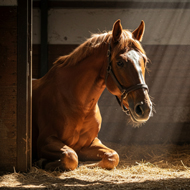
"Peter was the catalyst for the fabulous practice that has influenced so many people" - Rossdales Veterinary Surgeons.
Renowned veterinary surgeon Dr Peter Rossdale has died following a short illness, it has been confirmed.
The 94-year-old, who was the founder of Rossdales Veterinary Surgeons, passed away on 26th November 2021, according to an announcement on Rossdales’ website.
The announcement reads: “It is with great sadness that we announce that our Founder, Dr Peter Rossdale, passed away on 26th November 2021, at the age of 94 years, following a short illness.
“Described by Rossdales' former senior partner Professor Sidney Ricketts as 'the 'giant', whose shoulders we 'stood on', Peter was the catalyst for the fabulous practice that has influenced so many people.
"We all thank Peter for our opportunities, and we are very grateful to him for his foresight, direction and kindness. We are very sorry to lose him.
A graduate of the RVC, Dr Rossdale entered general practice in Rye, and subsequently spent several years in equine practice, before opening his own practice in Newmarket 1959. He was later joined by other pioneering veterinary surgeons who together formed the foundations of Rossdale & Partners, which is now world-renowned as Rossdales Veterinary Surgeons.
Dr Rossdale’s extensive career saw him obtain an FRCVS by thesis in 1967 and, in 1985, a PhD from Cambridge University based on published papers in the peer-reviewed literature. He also received Honorary Doctorates from the Universities of Berne, Edinburgh and Sydney and served on the scientific advisory boards of the Wellcome Trust, the Horserace Betting Levy Board and the Animal Health Trust.
Dr Rossdale was editor of the Equine Veterinary Journal (1980-2010) and editor-in-chief of Equine Veterinary Education (1986-2006). He retired from practice in 2004.
Image (C) Rossdales Veterinary Surgeons.



 Zoetis UK has called on horse owners to complete a short online survey about their horse's behaviours.
Zoetis UK has called on horse owners to complete a short online survey about their horse's behaviours.